|
|
|
Sort Order |
|
|
|
Items / Page
|
|
|
|
|
|
|
| Srl | Item |
| 1 |
ID:
181187
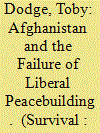

|
|
|
|
|
| Summary/Abstract |
The collapse of the US-aligned Afghan government and the seizure of Kabul by the Taliban in 2021 as the United States withdrew its forces was ultimately caused by a change in US government policy in June 2003. At that point, the George W. Bush administration dropped its aversion to state-building and its plan for a limited intervention designed to rid the country of al-Qaeda and the Taliban. The US instead undertook an extended exercise in liberal peacebuilding, involving the creation of an institutionally and coercively powerful centralised Afghan state and a liberal-democratic system. This enterprise was inherently misconceived, largely ignoring Afghan history and culture, as well as the limitations of the US and its partners. The painful experience of the past 18 years indicates that liberal peacebuilding, at least along the lines of the US-led effort in Afghanistan, should not be attempted again.
|
|
|
|
|
|
|
|
|
|
|
|
|
|
|
|
| 2 |
ID:
075406
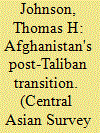

|
|
|
| 3 |
ID:
104671
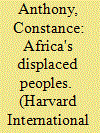

|
|
|
| 4 |
ID:
152739
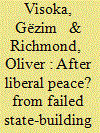

|
|
|
|
|
| Summary/Abstract |
Attempts to build a liberal peace and a concurrent neoliberal state in Kosovo have not managed to produce a sustainable and emancipatory peace. Instead, they have produced a local and negative hybrid peace that has been co-opted by the dynamics of local state formation and state contestation. These dynamics have overshadowed a meaningful transition from ethnic hostility to sustainable peace that should encompass pluralism, security, law, rights, and liberal institutions. This article examines this emergence of a negative hybrid peace and explores the prospects for a more emancipatory peace based on a local pro-peace infrastructure that avoids the pitfalls of liberal peace in practice.
|
|
|
|
|
|
|
|
|
|
|
|
|
|
|
|
| 5 |
ID:
158652
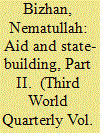

|
|
|
|
|
| Summary/Abstract |
Part I of this article found that, in South Korea and Taiwan, institutional legacy and continuity as well as the politics of aid did matter for post-war state-building. The inheritance and continuity of Weberian states and the receipt of aid either as budget support or increasingly aligned with local priorities helped to foster state-building. Part II of the study in this article explores a different dynamic of post-war aid to Afghanistan and Iraq which had a legacy of neopatrimonial and weak states. It argues that under more adverse initial conditions – for a neopatrimonial state – the role of aid regime and state-building strategies become even more important. Under these conditions, aid and state-building strategies may undermine state-building if they induce discontinuity in the existing state capacity and create parallel institutions to those of the state. Depending on the policies, state weakness may be reinforced if leaders are preoccupied with the politics of patronage.
|
|
|
|
|
|
|
|
|
|
|
|
|
|
|
|
| 6 |
ID:
142605
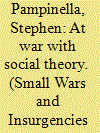

|
|
|
|
|
| Summary/Abstract |
As US counterinsurgency campaigns draw to a close, doctrine for asymmetric warfare written during the War on Terror has come under heavy criticism. While many have argued that this shift to ‘winning hearts and minds’ is evidence that the United States is taking humanitarianism and nation-building seriously, others argue that a wide gap exists between US counterinsurgency doctrine and the protection of civilians afflicted by conflict. In this article, I show that the latter is true by comparing theories of instrumental and communicative action to US doctrine for operational design, stability operations, and counterinsurgency. I argue that these texts treat the people as an object to be manipulated for the achievement of pre-determined self-interested strategic goals rather than members of a community that jointly designs operations to fulfill shared objectives. However, US doctrine does contain communicative elements that, if prioritized, would better support humanitarian and state-building objectives otherwise subordinated in the War on Terror.
|
|
|
|
|
|
|
|
|
|
|
|
|
|
|
|
| 7 |
ID:
074845
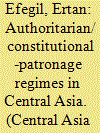

|
|
|
| 8 |
ID:
180622
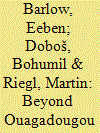

|
|
|
|
|
| Summary/Abstract |
The article evaluates the current worsening security situation in Burkina Faso and ties it to a lack of state-building in the country. Based on Tilly's approach to state-building, it, consequently, draws a set of recommendations aiming to strengthen the effectiveness of Burkinabe security forces as a primary step to stop the current wave of violence and establish more stable state institutions. These would become a first step of the process that is necessary to stabilise the situation in the region, enhance the Pillars of State, and allow the state institutions to overcome the militias. The article clearly states that foreign intervention and military solution only of the conflict cannot lead to a successful result. Burkina Faso needs to enhance institutional penetration throughout its territory to allow for the mitigation of the rebellions not only in this instance but also for the future and strengthen the state-building project.
|
|
|
|
|
|
|
|
|
|
|
|
|
|
|
|
| 9 |
ID:
148783
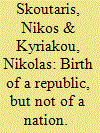

|
|
|
|
|
| Summary/Abstract |
The principle of bicommunality has been advanced as a founding feature of state-building in Cyprus. The aim of this article is to provide a systematic account of the different variations of the bicommunal principle enshrined in the Constitution of the Republic of Cyprus and in the Annan Plan as the most comprehensive proposal for the reunification of the island. In order to achieve its scope, the article focuses on the provisions concerning state institutions and citizenship. It argues that, in all those constitutional structures, state-building is not linked with nation-building. In fact, the acceptance of bicommunalism as a fundamental principle of the united Cyprus proves that the main concern has been the accommodation of the political tensions resulting from a divided society.
|
|
|
|
|
|
|
|
|
|
|
|
|
|
|
|
| 10 |
ID:
153869
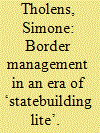

|
|
|
|
|
| Summary/Abstract |
International border management strategies have become the favoured practice to counter global threats, notably terrorism, migration flows and ‘weak states’. This article shows how border security assistance is translated and has political consequences in contexts where sovereignty is contested. It first offers a new conceptualization of contemporary security assistance as a form of ‘statebuilding lite’. These practices are void of comprehensive strategies for broader security governance, and are decentralized, pragmatic and ad hoc. The modus operandi is one whereby each donor develops its own niche, and directly supports specific agencies in the target state. Secondly, the article demonstrates how these tendencies play out in the one of the most important contemporary cases. Assistance to Lebanon since the outbreak of the Syrian civil war is particularly revealing, since Lebanon has received large numbers of Syrian refugees crossing its borders; witnessed rekindling of sectarian violence; and harbours Hezbollah, whose military operations in support of the Assad regime in Damascus draws Lebanon directly into the Syrian conflict. The ensuing situation, where vast amounts of security assistance reach Lebanon's many security agencies in complex ways, can best be described as a security assistance ‘bonanza’. In a micro-study of how the Lebanese Army, police, intelligence and customs agencies have engaged with an EU border management project, the article analyses how discourses of ‘integration’ have encountered the hybrid Lebanese context. It asserts that in the absence of a domestic political strategy, the state reverts back to basic modes of security-driven governance, aided by the readily available security assistance by actors with primarily strategic priorities. Drawing on the case of Lebanon allows us to fundamentally re-think how contemporary security assistance is practiced, and permits conceptualizations of global–local security linkages in a post-national world.
|
|
|
|
|
|
|
|
|
|
|
|
|
|
|
|
| 11 |
ID:
131979
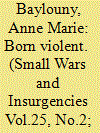

|
|
|
|
|
| Publication |
2014.
|
| Summary/Abstract |
We know little of the internal governing practices of non-state actors once in control of territory. Some territories have witnessed the establishment of new institutions of public goods remarkably similar to state institutions. This article compares four armed political parties governing territory during the Lebanese civil war. These non-state violent actors established complex political and economic institutions and administrative structures. Despite the wide range of ideologies and identities of these actors, they all converged in their institutional priorities, although not in their capacities or the particular ways of achieving those priorities. Data from interviews and the actions of the armed political parties suggest a combination of ideology and desire for control is causal in generating public institutions, partly attributable to the high degree of citizen activism marking the Lebanese case.
|
|
|
|
|
|
|
|
|
|
|
|
|
|
|
|
| 12 |
ID:
082358
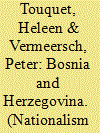

|
|
|
|
|
| Publication |
2008.
|
| Summary/Abstract |
This essay seeks to move beyond the traditional discussions on state change in Bosnia-Herzegovina by assessing the usefulness of shifting attention away from state- and institution-building efforts by domestic or international political elites and by focusing instead on the actions of local nonstate actors. We advocate a theoretical investigation into what might be gained from devoting new scholarly attention to identity-forming processes at the sidelines of governmental politics. We add empirical support to our argument by analyzing the work of a number of organizations in Bosnia that mobilize Bosnian citizens along nonethnic lines and construct alternative state-building narratives
|
|
|
|
|
|
|
|
|
|
|
|
|
|
|
|
| 13 |
ID:
152969
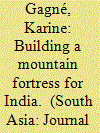

|
|
|
|
|
| Summary/Abstract |
This article examines the relationship between affect and the state in post-colonial India, foregrounding sympathy as a feeling that arises from the embodied encounters and interactions between the state and a local population through state-building in the Himalayas. It establishes the emergence of sympathy in the materiality of the Himalayas and in the historical conjuncture of the passage to Indian nationhood in Ladakh, which was marked by the mobilisation of the local population in the defence of the territory of India amid the first Indo-Pakistani war (1947–48). This article argues that sympathy, in leading the state to reimagine the population of Ladakh, is integral to the reconfiguration of the region into a border area and to the rethinking of the sovereignty of the Indian state at its Himalayan frontier.
|
|
|
|
|
|
|
|
|
|
|
|
|
|
|
|
| 14 |
ID:
108278
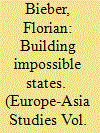

|
|
|
| 15 |
ID:
156246
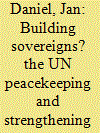

|
|
|
|
|
| Summary/Abstract |
This paper contributes to the debate on the recent ‘stabilization turn’ in United Nations (UN) peacekeeping by inquiring into a changing set of practices by which the UN intends to ‘strengthen the authority of the state.’ Drawing on Piiparinen’s notion of sovereignty-building as an emerging paradigm of conflict management, the study analyses the support for state authority and sovereignty in two modalities of contemporary UN peace operations – UNIFIL II and MINUSMA. While the two analysed missions significantly differ when it comes to the extent of their tasks, or the rules for the use of force, they both highlight the importance of local politics and agency in the implementations of their mandates and the need to strike a compromise between the contending visions on what form of sovereignty should be supported. By doing so, the paper points out the importance of ‘local’ and contextual emergence of the practices of sovereignty-building.
|
|
|
|
|
|
|
|
|
|
|
|
|
|
|
|
| 16 |
ID:
132268
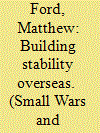

|
|
|
|
|
| Publication |
2014.
|
| Summary/Abstract |
In 2011, the Department for International Development, the Foreign & Commonwealth Office, and the Ministry of Defence launched the Building Stability Overseas Strategy (BSOS). This document sought to integrate cross-government activity as it related to conflict and security so as to 'take fast, appropriate and effective action to prevent a crisis or stop it escalating and spreading'. At the heart of the strategy was the recognition that addressing instability and conflict overseas was morally right and in the UK's national interests. This confluence of foreign policy realism and ethical outlook most clearly found harmony in the acknowledgement that it was cheaper for the international community to avoid conflict than it was to try to manage it. Through an examination of three historical case studies (Uganda 1964-1972, Rhodesia-Zimbabwe 1979-1981, and Sierra Leone 2000-2007), this article seeks to demonstrate just how difficult this seemingly sensible strategic outlook is. In particular, the article shows there are historical parallels in British postcolonial history that very closely resemble contemporary policy choices; that these can be used to define what is different about past and present practice; and, which in turn, can be used to - at least tentatively - mark out the potential strengths and weaknesses in BSOS.
|
|
|
|
|
|
|
|
|
|
|
|
|
|
|
|
| 17 |
ID:
186300
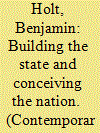

|
|
|
|
|
| Summary/Abstract |
In 1966 the Mizo National Front (MNF) instigated a separatist conflict against the Indian state. This article argues that an environment conducive for separatist insurgency was created by the early 1960s in the Mizo Hills, a direct result of problematic state- and nation- building practices. First, there was an inability to initiate a successful state-building drive to overcome deep-seated challenges bestowed by colonial rule. Second, the friction between regional and national conceptions of identity was not resolved. This argument exploits a clear research gap. Currently there is a convincing explanation for the MNF’s transition towards civil war between 1961-66. Yet, explaining the structural factors which created an environment conducive for separatist conflict remains elusive. This article plugs that gap, through archive-led historical analysis. In the process, it provides wider insights for conflict dynamics in India’s northeast and raises broader questions about interdisciplinary research in the subfield of intrastate conflict.
|
|
|
|
|
|
|
|
|
|
|
|
|
|
|
|
| 18 |
ID:
191056
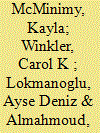

|
|
|
|
|
| Summary/Abstract |
Recognizing that militant, non-state groups utilize social media and online platforms to reach members, sympathizers, and potential recruits, state agencies and social media corporations now increasingly regulate access to accounts affiliated with such groups. Scholars examining deplatforming efforts have, to date, focused on the extent of audience loss after account restrictions and the identification of strategies for regrouping online followers on the same or different platforms over time. Left unexplored is if and how militant non-state groups adapt their official messaging strategies in response to platform restrictions despite continuing online access to them. To begin to fill that gap, this study compares ISIS’s 550 images displayed in the group’s official newsletter al-Naba six months before and after Europol’s November 2019 take-down of terrorist affiliated accounts, groups, channels, and bots on Telegram. It conducts a content analysis of images related to militaries and their outcomes, non-military activities and their outcomes, and presentational forms. The findings demonstrate that ISIS visually emphasizes its standard priming approach but shifts its agenda-setting strategy. While retaining some of its standard visual framing practices, the group also alters frames, particularly those related to images showing opposing militaries and military outcome.
|
|
|
|
|
|
|
|
|
|
|
|
|
|
|
|
| 19 |
ID:
089514
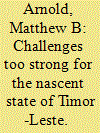

|
|
|
|
|
| Publication |
2009.
|
| Summary/Abstract |
Timor-Leste was badly shaken by a violent national crisis from April 2006 to April 2008. Central to the turmoil were the presence and actions of two groups of ex-soldiers from the Timorese army, known as "petitioners" and "mutineers." This article examines their roles in driving the crisis, by empirically mapping their history, motivations, and relationships
|
|
|
|
|
|
|
|
|
|
|
|
|
|
|
|
| 20 |
ID:
163703
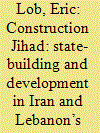

|
|
|
|
|
| Summary/Abstract |
Based on fieldwork in Iran and Lebanon, this article compares the Iranian reconstruction and development organisation Construction Jihad with its Hizbullah-affiliated subsidiary in Lebanon. Beyond shedding light on Iranian and Lebanese history and politics, this comparison offers insight into the transnational diffusion of a development organisation by a state actor to its non-state or quasi-state ‘client’ in the Muslim and developing world. Despite the distinct environmental and operational conditions of Iran and Lebanon, Construction Jihad similarly assisted a nascent Islamic Republic of Iran (IRI) and a fledgling Hizbullah with state-building. The latter consisted of consolidating coercive power against domestic and foreign opponents, increasing administrative capacity through service provision and post-war reconstruction, and strengthening the political and religious identity of citizens and constituents. Regardless of the differing contexts of Iran and Lebanon, Construction Jihad counter-intuitively possessed a similar organisational and developmental model in both countries that did not neatly conform to the dichotomous typologies in development studies. This seemingly contradictory model was largely faith based, exclusive, distributive and top down with certain decentralised, community driven and participatory elements.
|
|
|
|
|
|
|
|
|
|
|
|
|
|
|
|
|
|
|
|
|